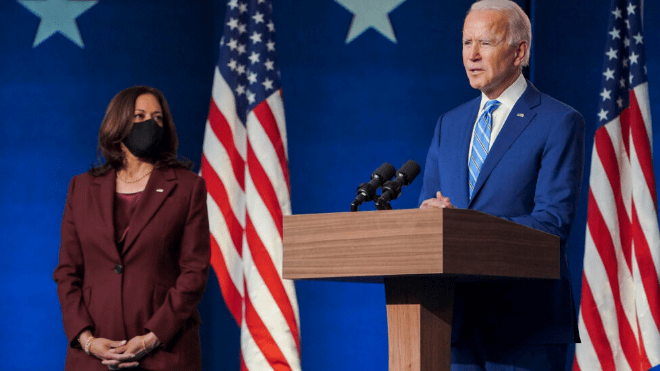Where We Are Now
By Paul Scham
I am writing this in the first flush of relief after President Biden and Vice-President Harris have been sworn in and the ex-president has been deposited at Mar-a-Lago. As Americans, we rightly feel we have accomplished something big. However, as Americans who are also deeply concerned with and worried about Israel’s future, the picture is much less clear. Israel faces an election on March 23rd where the only question seems to be whether or not Bibi’s rightwing opponents will topple him – or whether Bibi will survive as prime minister (the latter currently seems more likely). The “Left” is in tatters; Meretz seems assured of at least 5 seats but numerous other small center-left grouplets are swarming in the polls, trying to coalesce and reach the magic threshold percentage of 3.25% needed to enter the Knesset. There is, for the first time, talk of a Jewish-Arab party with mainstream aspirations, but no one has yet come up with a political plan, a program, and a set of forces that might propel it (you can listen to our recent webinar on this issue here). Meretz has put two Israeli Arabs in its first five seats in its Knesset list for the coming election, but most agree that that does not a real Jewish-Arab party make. Be sure to see the important analysis of Jewish-Arab political cooperation in Israel by Ron Skolnik on p. 3 of this issue of Israel Horizons.
Nevertheless, perhaps because I live in the District of Columbia, just a few miles from the Capitol where it all happened, I am feeling strangely optimistic. I have no illusions that Israeli-Palestinian peace is high on anyone’s agenda, but I can’t help feeling that the political change here truly makes a difference, even for Israel, where most of the Jewish population is probably not happy to be moving from Trumpworld to Bidenworld. Not that the Occupation is likely to dissolve any time soon, but the American role, which remains large in the Middle East and especially with matters relating to Israel, is now controlled by rational hands and minds. I think it matters whether what is still the most powerful country in the world is run by people who have a firm grip on reality – and that the center of gravity of this country has moved somewhat to the left in a variety of ways, including how the mainstreams of the Jewish and the general communities regard the Israeli-Palestinian conflict.
It matters that J-Street has endorsed the majority of Democrats in both the House and Senate. It matters that PIN, the Progressive Israel Network, is now a recognized address for Jewish sentiment on Israel. It matters that the US will almost certainly soon resume aid to the Palestinian Authority, that a Palestinian representative will likely soon be stationed again in Washington, that Jared Kushner will no longer represent the United States in Middle East forums, that there will be at least a serious attempt to reconstitute the JCPOA (the ‘Iran nuclear deal’), and that American policy will no longer be calibrated to please the corrupt and dangerous Crown Prince of Saudi Arabia, the notorious Mohammed bin Sultan, better known as MBS. Most important, we know there is an administration in place which shares our values, if not necessarily our specific policies with regard to the conflict. But even our own longterm aspirations for the shape of Israeli-Palestinian relations are now in flux.
As regular readers of this column know, I am increasingly drawn to the concept of Confederation as an eventual solution to the Israeli-Palestinian impasse; not as an alternative to the two-state solution but, rather, as a fulfillment of it. Confederation is represented in Israel by the growing movement of A Land for All , a joint Jewish-Arab organization that is not a political party, but rather a growing social movement within Israeli civil society. It is building on the reality of today, that two nations claim the whole land of Israel/Palestine and that neither is going to leave or give up its claims under any conceivable circumstances. While annexation of any part of the West Bank would be illegal under international law and serve to increase enmity between Palestinians and Israelis, it might, in the long run, make a confederation-type or other arrangement between Israel and a future Palestinian state inevitable, as implied by University of Pennsylvania Professor Ian Lustick in his thoughtful and controversial book, Paradigm Lost: From Two-State Solution to One-State Reality. Lustick argues that de facto annexation has already occurred, and that the two-state solution, which he championed for decades, is now unattainable.
That may be the case but neither Lustick nor anyone else believes that any amelioration of the situation can happen soon, absent a surprise deus ex machina which might upend our calculus. Meanwhile, what is to be done?
Partners for Progressive Israel has always focused on building connections between progressive Israelis and Americans. That might be a bit easier now that we – the American Jewish Left – again has some access to influence in this new administration, which shares at least some of our ideas regarding the building blocks of a more stable Middle East. Even if, as expected, the Israeli Right remains in power, under whichever leader, it will have to bend with the winds coming from Washington. We analyze and publicize Jewish-Arab cooperation examples with our Conversations with Israel and Palestine webinars and with Kolot-Voices of Hope. We took a leading role in the campaign for the Hatikvah slate in the World Zionist Organization, where we and our allies work tirelessly to institute progressive programs and limit the influence of the Right. Especially in the run-up to an Israeli election (which is most of the time nowadays) we disseminate news on social media regarding the Israeli Left, as it gropes toward a set of common and achievable policies as well as a Jewish-Arab political party or coalition that can represent all Israelis and institute progressive social change.
Parenthetically, it should be noted that this is indeed a tall order. In Israel, where political parties and movements are categorized on the political spectrum according to their views on “security” issues, Arab parties have been automatically categorized as “Left,” and, indeed, since 2015 have coalesced into the Joint List under the leadership of Ayman Odeh of Khadash, who has much in common with Meretz and civil society organizations on the Left. But the Joint List also includes parties such as the United Arab List (Ra’am), a moderate Islamist party, whose leader acknowledges that, except for security issues, it has more in common with Shas that with any parties of the Center or Center-left. And indeed, Bibi has been campaigning in Arab villages and town, (hoping Arabs will vote for him “in droves”) and there is discussion of a prominent Joint List leader defecting to the Likud. So finding a common program and leader that could unite large numbers of Arabs and Jews under a progressive banner is a challenging task.
However, to bring it all back home, though we are not a lobbying organization and don’t work with Congress or the executive branch, we join with our PIN colleagues and many others in trying to influence American society and policy towards a recognition that, without Palestinian (as well as Israeli) self-determination, there cannot be peace, despite the recent normalization of relations of some Arab states with Israel. Now, we know that we will see our voices heard by decision-makers, and that is, indeed, a welcome achievement.
___

Paul Scham is President of Partners for Progressive Israel and the director of the Gildenhorn Institute for Israel Studies at the University of Maryland.






Leave A Comment